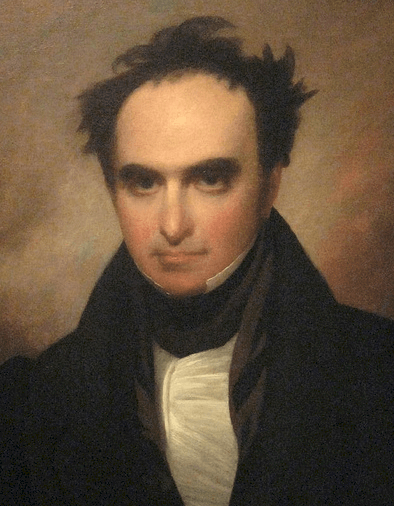[I]f we and our posterity reject religious instruction and authority, violate the rules of eternal justice, trifle with the injunctions of morality, and recklessly destroy the political constitution, which holds us together, no man can tell, how sudden a catastrophe may overwhelm us, that shall bury all our glory in profound obscurity.
—Daniel Webster, February 23, 1852, speaking before the New York Historical Society—
Daniel Webster
The results of the 2016 election are instructive for Christians on many levels. While believers have much for which to be thankful, some of the ballot initiatives sound alarm bells for Christians, the culture, and the nation at large.
By 65 percent to 35 percent, Colorado voters passed a law allowing doctors to prescribe a life-ending drug to a terminally-ill patient who requests it. Melissa Ortiz, a resident of Washington, DC, which also recently passed a similar law, is alarmed. She writes, “Joining five other states that have legalized this practice, the tragic choice by Colorado voters reflects how our nation is quick to devalue life and deny that suffering has meaning.” Ortiz and others are rightly concerned that the “right to die” will in many cases become pressure to die: In states that allow a doctor to prescribe end-of-life drugs to a terminally-ill patient’s request, “a growing number of sick people are being denied medical treatment coverage and offered assisted suicide instead.”
In states that permit physician-assisted suicide, the “right to die” often is becoming the pressure to die.
Here’s another alarm bell. A recent survey found that 60 percent of Christians agreed that “physicians should be allowed to assist terminally ill patients in ending their life.” Moreover, 38 percent of evangelicals agreed, either somewhat or strongly, with this idea: “When a person is facing a painful terminal disease, it is morally acceptable to ask for a physician’s aid in taking his or her own life.”
Assisted-suicide wasn’t the only issue before voters. In at least 3—and probably in 4—out of 5 states, they approved laws permitting the use of marijuana for recreational purposes. In California, Massachusetts, and Nevada, the votes weren’t even close. Recreational marijuana also likely passed in Maine. Only in Arizona was it narrowly defeated, although Arizona permits the use of marijuana for medical purposes. Voters in Arkansas, Florida, Montana, and North Dakota approved laws allowing for medical marijuana use. Thus, now more than half of the states have laws permitting marijuana usage in some form. Many sound, practical reasons exist for opposing the legalization of pot for fun—and many even exist for opposing medical marijuana as well (also go here and here).
What should Christians believe about this issue? The Family Research Council’s Rob Schwarzwalder addresses this question clearly and concisely in this article. He reminds us of the physical dangers the drug poses, that as believers we are stewards of our bodies, that we have an obligation to obey the law (marijuana use still is illegal at the federal level), and that substance abuse has ties to the occult. Moreover, contends Schwarzwalder, the Christian is to exercise self-control in the power of the Holy Spirit. Thus, “substance abuse, including the use of marijuana as a vehicle for recreation, offers a stark contrast to submission to the King of kings.”
What do Christians believe about marijuana usage? A survey done in 2013 found that among 18-29 year olds who call themselves Christians, 45 percent admitted to having used marijuana, and 50 percent either “strongly favored” or “favored” legalizing the substance. Among all age groups of Christians, 39 percent favored legalization and 54 percent opposed it.
 In discussing the results of these ballot initiatives, WallBuilders Live! co-host David Barton lamented the place where the culture—and Christians—have arrived. Physician-assisted suicide and marijuana usage—especially recreational marijuana—could not have been approved without a widespread disregard for moral and ethical standards of right and wrong. The culture, and Christians as well, have abandoned a belief in absolute truth. Read and hear David Barton’s comments on this page.
In discussing the results of these ballot initiatives, WallBuilders Live! co-host David Barton lamented the place where the culture—and Christians—have arrived. Physician-assisted suicide and marijuana usage—especially recreational marijuana—could not have been approved without a widespread disregard for moral and ethical standards of right and wrong. The culture, and Christians as well, have abandoned a belief in absolute truth. Read and hear David Barton’s comments on this page.
This is not to say every question has a simple, straightforward, up or down answer from a biblical perspective. Some issues are more complicated than others; some leave room for debate among sincere Christians. Discussion among Christians over medical marijuana use is understandable, for example; but let’s not be naïve. Legalization of medical marijuana often is a gateway to legalization of recreational pot—and as we already have said, use of the substance is against federal law.
Abusing one’s body with drugs and taking one’s own life, however, are crystal clear issues, and Barton is right. Acceptance of these unethical and unbiblical ideas has occurred because the foundational concept has eroded that absolute truth exists and applies to everyone, everywhere, in all circumstances. Sadly, the American people, including Christians, no longer believe in right and wrong.
Author and Christian speaker Josh McDowell has studied this trend. He cites surveys to back up his contention that even Christians are abandoning the idea that truth is objective and exists apart from themselves.

- More than 25 years ago, 51 percent of evangelical Christians rejected a belief in absolutes.
- In 1994, the percentage rose to 62 percent, and
- in 1999, to 78 percent.
- In 2011 the percentage of evangelical Christians not believing in absolute truth reached a staggering 91 percent!
Can anyone cite any evidence that the number has improved since 2011? David Barton is right. Ballot initiatives don’t offer any encouragement!
Yet another poll cited by McDowell found that just six percent of American teens believe in the existence of truth apart from themselves. Also, there’s just a 5 percent difference between Christian and non-Christians on this issue.
 Conservatism, contends David Barton, is being redefined by the cultural tide. Whereas being a conservative used to automatically mean, among other things, upholding traditional moral and ethical standards, the connection between these values and conservatism is being severed. Barton rightly points out that “we know from the Declaration of Independence that limited government starts with your view of God. If you don’t have a God-view and a moral view of government, you will not end up with limited government. So that’s the one thing that I think we have to work on in coming years.”
Conservatism, contends David Barton, is being redefined by the cultural tide. Whereas being a conservative used to automatically mean, among other things, upholding traditional moral and ethical standards, the connection between these values and conservatism is being severed. Barton rightly points out that “we know from the Declaration of Independence that limited government starts with your view of God. If you don’t have a God-view and a moral view of government, you will not end up with limited government. So that’s the one thing that I think we have to work on in coming years.”
Indeed, without abandoning its primary responsibility of spreading the gospel, the church must help its own members and the culture understand that absolute truth not only exists, but will be an ally if we cooperate with it.
Christians who don’t believe in absolutes have missed a core teaching of the Bible and the Christian faith. Americans who don’t believe in them have missed a central tenet of the human experience and the American experiment.
The need is critical. Much more needs to be said about it, so we’ll explore it in greater depth in future posts.
Copyright © 2016 by B. Nathaniel Sullivan. All rights reserved.


Be First to Comment